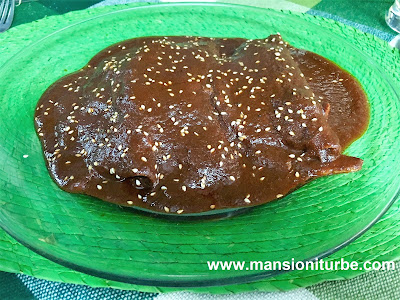Mole (MO-leh): A Composite Dish of Mexican Cuisine
Mole is one of the most representative of Mexican dishes. This Mexican main dish
par excellence, illustrates “culinary synchrony,” where pre-Hispanic, European
and even Arab ingredients are combined (in the latter case, sesame seeds and
almonds).
 |
| Mole is one of the most representative of Mexican Dishes |
Chile is the
mainstay of many traditional dishes, as well as a symbol of identity in Mexico;
it is one of the key ingredients in Mexican
cuisine along with corn, squash and beans. Countless dishes incorporate it,
including mole, which dates back to pre-Columbian times.
 |
| Chile is one of the key ingredients in Mexican Cuisine |
The word “mole” comes from the nahua
"mulli," which means stew or mixture, alluding to the sauce. We find
the mention of “mole” (or “pipían”) as early as in the 16th Century
in “The General History of Nueva España Things, or The Florentine Codex,” by
Fray Bernardino de Saghún. Over time, new ingredients were added to the
mix. Recipes have been passed down from generation to generation
through traditional cooks, families and convents, and there is no single,
definitive mole.
 |
| Mole a Composite Dish of Mexican Cuisine |
The convent
kitchen were “food laboratories” at the colonial time, when some of the most
characteristic of Mexican cuisine
dishes were created. One of the most famous is the mole poblano,
who was born in the convent of Santa Rosa in Puebla.
Mole has evolved and is predominant in Puebla, Oaxaca,
Michoacán, and San Pedro Atócpan (south of Mexico City), where you can find
several of the most well-known variations.
 |
| Mole a traditional plate of the Mexican Gastronomy |
Mole is a thick sauce which typically includes a mixture of
flavors such as chiles, chocolate, almond, cinnamon, sesame, tomato, raisins,
ginger, garlic, cumin, and even tortillas. The ingredients and preparation may
vary from town to town, or even from household to household.
Michoacán is known for its “artisan chiles” that
are dried on mats. Such is the case of Queréndaro where they produce chiles
largos, criollo, serrano, as well as guajillo and pasilla.
There is even a “chile faire” In August. They create a myriad of dishes with
chile, like the famous chiles capones. Not surprisingly,
Queréndaro has own variety of mole.
 |
| Mole is a thick sauce with a mixture of flavors |
Tingambato, a town
between Pátzcuaro and Uruapan (i.e., not far from Pátzcuaro),
has its own delicious variety of mole. (Incidentally, Tingambato is also famous
for its yearly geranium festival, which you shouldn’t miss if you happen to be
here in March. As with all festivals, gastronomy plays an important role in this one.
In Santa María
de Guido (part of Morelia), a mole festival is held usually in
August. It includes cultural events and artistic activities.
A must-do of our
Mexican cuisine is the mole, and
you'll find it in abundance around Pátzcuaro
Lake. Take a tour of the towns around Pátzcuaro Lake and discover the expertise of the traditional cooks in
the many ways to create mole.
 |
| Mexican Food: Chicken in Mole Sauce at Doña Paca Restaurant in Patzcuaro |
In our Hotel Mansion Iturbe in Pátzcuaro, you can sample several of
our popular mole variants.
 |
| Mexican Food: Enmoladas at Doña Paca Restaurant in Patzcuaro |
Come and
discover the flavors of Michoacán,
and insist on at least several different mole venues. Michoacán cuisine is one of the diverse and delicious experiences
in Mexico!
Note: If
you wish to attend these different fests, we suggest that you verify the exact
dates, since they are not set in stone.
*Text and pictures property of Hotel Mansión Iturbe.
We intive you to check more post in our blog, you will find information about Pátzcuaro and its surroundings that we hope will be useful for your next trip to our colonial town in Mexico!
Here we suggest you some post:
Hotel Mansion Iturbe
Portal Morelos 59









Comentarios